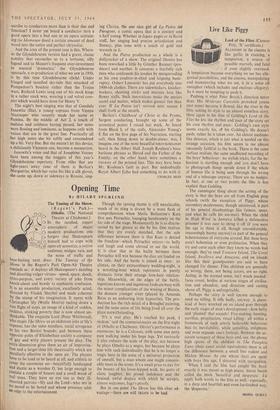Opening Time
By HILARY SPURLING The Taming of the Shrew. (Regent's Park.)- , p, Othello. (The National 0, atmosphere of major CD modern productions one co forgets that Shakespeare -P himself had to cope with
open-air acoustics, a restive audience, midges, rain, and
the noise of traffic and bear-baiting next door. The Taming of the Shrew in the Regent's Park Open-Air Theatre reminds us: it deploys all Shakespeare's dazzling and diverting vulgar virtues—speed, space, shock, cross-purpose, and every variety of joke from knock-about and bawdy to euphuistic confusion. It is an ensemble production, excellently acted, directed by Vladek Sheybal and made coherent by the stamp of his imagination. It opens with Christopher Sly (Wolfe Morris) reeling down a vast flight of steps, an image of a kind of sodden, reckless, stinking poverty that is now almost un- thinkable. The exquisite Lord (Peter Whitbread), Who stages The Shrew as an elaborate joke at Sly's expense, has the same mindless, racial arrogance as his two Borzoi hounds; and between these 0Pposite poles of Elizabethan society a company of gay and witty players present the .play. The extra dimension gives them an air of improvisa- tion and a larger than life theatricality which are Peculiarly effective in the open air. The players have to be loud to be heard at all, and athletic to cover the enormous set—beautifully landscaped and elastic as a wooden 0, but large enough to contain a couple of houses'and a small wood of real trees. They have an eye too to their ill- assorted patrons—Sly and the Lord—who are' in 110 mood to be bored and whose presence adds an edge to the entertainment.
Though the taming theme is still unpalatable, much of its sting is drawn by a mute flash of comprehension when Sheila Ballantine's Kate first sees Petruchio, lounging handsomely on the far side of the stage. Momentarily he is as discon- certed by her glance as she by his. One realises that they are evenly matched, that the sole difference between them is that Kate is denied the freedom—which Petruchio enjoys—to bully and laugh and come abroad to see the world. It is clear that in the battle between them Petruchio will win because the dice are loaded on his side. And the battle is joined at once : its climax, on their extraordinary wedding-night, is a wrestling-bout which represents in purely dramatic form their strange love-hate relation- ship. Meanwhile, on the edges of the battle, ingenious knaves and ingenious fools are busy with the minor complications of the wooing of Bianca, the demure younger sister (played by Amanda Reiss as an endearing little hypocrite). The pro- duction has the rich detail of a Breughel painting, and the same sense of life being lived all over.the place notwithstanding.
'It's a real play. He's reached his peak, I reckon,' said the commissionaire on the first night of Othello at Chichester. Olivier's performance is enormous; he is a Colossus, with some nice petty men walking under his huge legs. Yet curiously it also reduces the scale of the play, not because he plays Othello as a negro, but because he plays him with such individuality that he is no longer a tragic hero in the sense of a universal projection of oneself, but a man whom one might conceiv- ably meet in the street. It's a small price to pay for the beauty of his loose-hipped walk, his gusts of silent laughter,' his proud indolence and the bruised, awful despair with which he accepts, almost welcomes, Iago's proofs.
But in one point The Shrew has this clear ad- vantage—there are still tickets to be had.






























 Previous page
Previous page